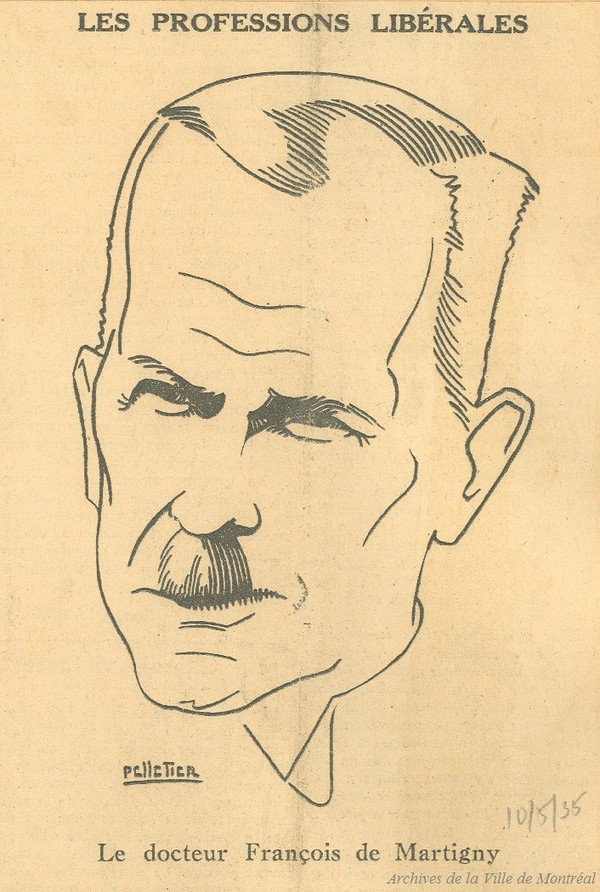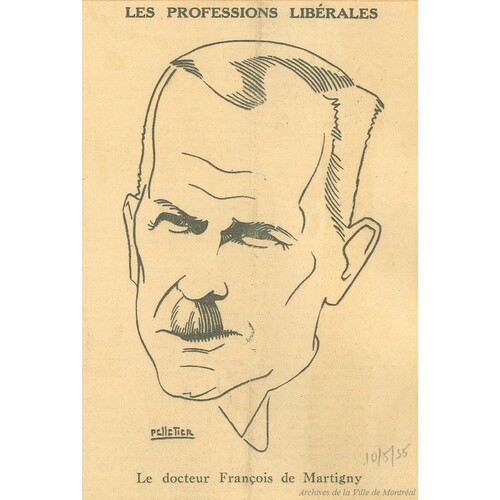
Source: Link
MARTIGNY, FRANÇOIS DE (baptized François-Xavier de Martigny, the name he sometimes signed), physician, surgeon, journalist, freemason, and army officer; b. 16 Oct. 1871 in Saint-Romuald-d’Etchemin (Lévis), Que., son of Adelstan de Martigny (Le Moyne de Martigny), a physician, and Louise de Martigny (Lemoyne de Martigny); m. 6 Sept. 1904 Maria Tarte (d. 7 May 1939), daughter of Joseph-Israël Tarte*, in the parish of Saint-Louis-de-France, Montreal, and they had at least five children; d. 28 Sept. 1940 in Montreal.
François de Martigny did his classical studies at the Collège de Lévis and then at the Collège Sainte-Marie in Montreal. After earning his md with distinction from the Université Laval there in 1894, he specialized in surgery in Paris, first at the Hôpital Necker and subsequently at the Hôpital International, where he was assistant surgeon.
During his time in Paris – he would travel back and forth to Montreal for about eight years – he founded (July 1894) in Montreal La Clinique, the periodical of which he was to be the editor in 1895 and the manager from 1910 to 1920. In this monthly, which he sometimes supervised from a distance, he advocated high standards for medical training and did not shy away from criticizing the faculty of medicine at the Université Laval in Montreal. For example, in 1896 La Clinique denounced the appointment, without a competition, of Dr J.‑C.‑S. Gauthier as assistant professor to the chair of hygiene. As a result, the faculty members regarded the magazine’s directors, who used the publication to oppose them, as revolutionaries. In 1897 Martigny would take advantage of one of his Paris trips to acquire original papers by French doctors for publication in La Clinique.
In October 1896, following the example of his brother Adelstan*, Martigny joined L’Émancipation, a Montreal freemasonry lodge, where he became senior warden in 1899. His masonic activities and ideas often got him into trouble with both the Roman Catholic clergy and several of his medical colleagues. Although Martigny was struck from the rolls of L’Émancipation in 1904 for not paying dues, his name would appear on its membership list when it was made public in 1910. To retain the position of surgeon at the Hôtel-Dieu in Montreal, which he held from at least 1909, he had to resume religious observance.
In 1902 Martigny had become one of the first members of the Ligue de l’Enseignement [see Godfroy Langlois*]. This organization called for reforms in education, including hygiene instruction in schools, health inspections, the development of a public-education program, and medical examinations of pupils. The clergy, who saw in these proposals a questioning of its authority, reacted sharply and the activities of the league were eventually shelved two years later. In 1906 the government of France recognized Martigny’s efforts in support of public teaching institutions and named him officier de l’Instruction publique.
The following year Martigny was elected to the board of governors of the College of Physicians and Surgeons of the Province of Quebec. In this capacity he took part in developing and promoting the Quebec Medical Act, which received royal assent two years later [see Albert Laurendeau*]. A general revision of the province’s medical laws, it had the notable effect of assigning more importance to clinical training in faculties of medicine. Martigny joined several other medical societies, including the Association Française de Chirurgie, the Société d’Urologie de Paris, and the International Association of Urology, memberships that drew criticism from his colleagues, who saw in these affiliations a negative commentary on the French Canadian medical community. In 1914 Martigny tendered his resignation, which was refused, from the board of governors of the College of Physicians and Surgeons of the Province of Quebec; however, later that year, following an election, he lost his position.
In 1910 Abraham Flexner of the Carnegie Foundation for the Advancement of Teaching published a report on the medical schools in Canada and the United States that deplored the lack of practical instruction and laboratories at the Université Laval in Montreal. Martigny took up this cause. With the help of his friend Alexis Carrel (the French surgeon and future recipient of the Nobel Prize in Physiology or Medicine in 1912, whom he had met during Carrel’s brief stay in Montreal in June 1904), Martigny had a meeting with Flexner on 12 April 1911 to argue the case for the faculty of medicine.
On 19 March 1915 Martigny enlisted in the French Canadian No.4 Canadian Stationary Hospital, raised by Arthur Mignault for the Canadian Expeditionary Force. He received the rank of major and worked as the hospital’s chief of surgery from May onward. On 6 May he set sail for Great Britain aboard the Metagama. While waiting for his unit to be deployed close to a theatre of military operations, he was temporarily assigned to British hospitals in Woolwich (London) and Princes Risborough. Offered to France by Prime Minister Sir Robert Laird Borden for the care of its wounded, the French Canadian No.4 Canadian Stationary Hospital was set up in 1915 at the Saint-Cloud racecourse in suburban Paris, where it would remain until the end of the war. In July 1916, when the stationary hospital, whose capacity reached 1,400 beds, became the French Canadian No.8 Canadian General Hospital, Martigny was promoted lieutenant-colonel. That September he founded the Association des Médecins Militaires Canadiens, of which he would be president until his return to Canada in 1917. On a few occasions Martigny had been dispatched to the military hospital in Compiègne, run by Carrel, and thus in December 1916 he was awarded the gold medal from the Société du Dévouement in recognition of his constant work and his surgical operations.
Martigny, however, was sent back to Canada before the end of the war. It seems that the ruthless struggle between Major Joseph-Napoléon Roy and Martigny had led to this decision of the military authorities. Roy, who had served in the military for 24 years, thought it unfair that Martigny, in July 1916, had risen to the rank of lieutenant-colonel, which was higher than his own, after only a little more than a year’s experience. He insinuated that Martigny had obtained the promotion because of his family’s political influence. Officially, it was Martigny himself who, for personal reasons, requested his return. In April 1917 he sailed for Canada; he was discharged on 1 December.
A civilian once more, Martigny again worked as a surgeon at the Hôtel-Dieu in Montreal and took part, in September 1919, in founding the Hôpital Français, a secular body responsible for treating the city’s French indigents. But as a result of financial difficulties and pressure from the clergy, the hospital was entrusted to nuns, and nine years later it became the Hôpital Sainte-Jeanne-d’Arc. Martigny worked there as chief surgeon until his retirement in 1938, and was recognized as an important figure in the country’s medical profession.
Martigny maintained a keen interest in military life. After the war he was actively involved with French Canadian veterans. In 1936 he was elected provincial grand president of the Canadian Legion of the British Empire Service League. He was also the provincial president of the Vétérans Français de la Grande Guerre and, in his capacity as lieutenant-colonel, a member of the Royal Canadian Army Medical Corps reserves. In August 1939 he asked for the privilege of organizing and taking charge of a military general hospital.
François de Martigny did not, however, get another chance to serve his country. During a fishing trip on the Rivière Nouvelle in the Gaspé region in August 1940, his canoe capsized. He narrowly escaped drowning and was rushed to hospital in Moncton, N.B. He was subsequently transferred to the Hôpital Sainte-Jeanne-d’Arc in Montreal, where he died.
BANQ-Q, CE301-S54, 18 oct. 1871. FD, Saint-Louis-de-France (Montréal), 6 sept. 1904. LAC, R611-298-7; R611-316-5, vol.211, file 6-R-382; RG 150, Acc. 1992-93/166, box 2427-1; Acc. 1992-93/167, box 30, file 372-5-56. Le Devoir, 1940. La Presse, 1917–40. BCF, 1920. Rita Desjardins, “Ces médecins montréalais en marge de l’orthodoxie,” Canadian Bull. of Medical Hist. (Waterloo, Ont.), 18 (2001): 325–47. Roger Le Moine, Deux loges montréalaises du Grand Orient de France (Ottawa, 1991). Michel Litalien, Dans la tourmente: deux hôpitaux militaires canadiens-français dans la France en guerre (1915–1919) (Outremont [Montréal], 2003). “Obituaries,” Canadian Medical Assoc., Journal (Toronto), 43 (1940): 500–1. Robert Soupault, Alexis Carrel, 1873–1944 (Paris, 1952).
Cite This Article
Michel Litalien, “MARTIGNY, FRANÇOIS DE (baptized François-Xavier de Martigny),” in Dictionary of Canadian Biography, vol. 16, University of Toronto/Université Laval, 2003–, accessed January 1, 2026, https://www.biographi.ca/en/bio/martigny_francois_de_16E.html.
The citation above shows the format for footnotes and endnotes according to the Chicago manual of style (16th edition). Information to be used in other citation formats:
| Permalink: | https://www.biographi.ca/en/bio/martigny_francois_de_16E.html |
| Author of Article: | Michel Litalien |
| Title of Article: | MARTIGNY, FRANÇOIS DE (baptized François-Xavier de Martigny) |
| Publication Name: | Dictionary of Canadian Biography, vol. 16 |
| Publisher: | University of Toronto/Université Laval |
| Year of publication: | 2018 |
| Year of revision: | 2018 |
| Access Date: | January 1, 2026 |



